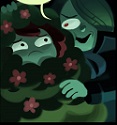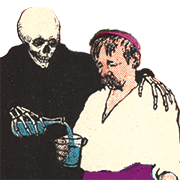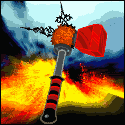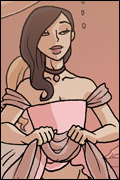|
I have an idea for an area control secret society themed game. The goal is to take the general theme of SJG's illuminati card game but make it good. My idea for reducing the politics behind attacking people in the combat portion of the game is for everyone's pieces to be considered allied by default. However, before the combat phase of the game, everyone throws a card with the symbol of a player in the middle of the board. The player whose symbol is on the most cards is considered "exposed" and is the only player that can be attacked during the combat phase. However, that player also gets the option to counterattack anyone they want at the end of the combat phase. Or something. It's an idea. Has this kind of "hidden voting to decide who can be attacked" mechanic been done before?
|
|
|
|

|
| # ? May 15, 2024 03:15 |
|
Anniversary posted:Do players have to taken an event? Can players take more than one event? I'm thinking no. No (so there's always 1 left over), probably stays face up (also with fate bonus?), though maybe it should be shuffled back into the deck. Thanks.  . . Right now the map is 18.5" x 16" with 15 cities:  Oh, and also there's a battefront (not sure I mentioned that before). Edit: sorry so tiny, looks like I lost the original. 
Foolster41 fucked around with this message at 02:26 on Feb 28, 2015 |
|
|
|
That makes sense, and I think you'd mentioned there's a battlefront as part of the theme but not exactly how it influences play? I take it it would make it harder to make deliveries? As for the Area Control Secret Society game, that's a neat idea that's really original as far as I know; but it also seems like it would be really, really unfun to be the one everyone attacks, especially if you're behind and their dividing up the scraps of what you no longer can defend. Though being able to attack whoever seems like it would be really good. How would you determine who gets to attack first, as that seems like it would sway whether you use this ability to pick off weak enemies or solely to stop the most powerful player. e: All the talk about randomness, especially post-decision randomness in the board game thread is really making me wonder if/how solvable my game design is... Anniversary fucked around with this message at 04:11 on Feb 28, 2015 |
|
|
|
Anniversary posted:This sounds like an interesting take on the resource based fighter concept, but if injuries are debuffs what causes the game to end? I also really like the idea that a bid resource becomes your fuel for actions for the round, so you're somewhat preemptively determining how explosive you want it to be. I really hate player elimination, so currently, if a player's character gets X injuries they abandon the character (thematically the actor probably pulls out of the movie's production because they took too many injuries or something) and the player gains a new character. Still deciding on how to balance this. Maybe they get an alternate, B-list actor character with reduced stats, or an old, washed-up actor character that starts with a random injury or two. But the game itself is paced by the Director's Demands deck, which lays out 3 face-up Director's Demand cards at a time that players are trying to fulfill with their characters' fighting. Mini-Objectives like "Reduce a Fighter's Resolve to 0 in 2 Actions" or "Move 8+ Spaces and gain 8+ Style Points in 1 Round." When a Director's Demand is met, the player that met it gets the card and the Victory Points (or equivalent) on it. The game lasts until a certain number of these cards have been completed. JMBosch fucked around with this message at 08:59 on Feb 28, 2015 |
|
|
|
Anniversary posted:That makes sense, and I think you'd mentioned there's a battlefront as part of the theme but not exactly how it influences play? I take it it would make it harder to make deliveries? Pirates and the blimp also have a chance of damaging planes. Storms slow down, and the monsoon does both damage and slows down. So far I have 21 missions, 13 upgrades/crew and 32 event cards.
|
|
|
|
That sounds really interesting, I hope to hear more about it and maybe even try it someday.
|
|
|
|
Impermanent posted:The goal is to take the general theme of SJG's illuminati card game but make it good. Haha How do you plan to incorporate the hidden voting? Because the precise mechanics can have cascading effects on the resulting social dynamics. Do players have one card for each other player? If the players take the card they played back into their hand, the other players can watch and develop an idea of who voted for them but not why. Getting the cards back to player's hands in secret would increase upkeep time geometrically. If cards are distributed or returned randomly, it could decrease the chances of players being able to vote for the opposing player they wish to, because they might not have the card to do it.
|
|
|
|
I have been playing with both of those ideas. I like the idea of there being a deck of player symbol cards used to vote, and everyone having a handsize equal to the number of players +1 or so of them. It would be possible to burn out on votes for a certain player this way, which would prevent anyone from being pounded on over and over again, in theory.
|
|
|
|
So, Iím getting obsessed with another project Iím hoping to actually get a print and play made up of soonish. Basically, itís a strategy game where each player controls a mech - their player board is the control panel of the mech, and when they buy new systems for their mech they slot on new bits to the player board. The physical layout of the control panel is important as well, as the direction your mech takes damage from (front / rear, left / right) will damage the corresponding system(s) on your control panel. If a system is destroyed, it is no longer usable and your core is exposed form that angle - taking damage from that direction will then damage the core of the mech instead. What Iím mostly wondering is what you guys would recommend for a victory condition or overall goal. The game is intended for 2-5 players, so Iíd rather not have player elimination as I really really donít like it. However, that means I still need a way to encourage players to attack each other and not get attacked in response. Some ideas I have floating around:
So yeah, thoughts on these conditions? Suggestions for other conditions? CodfishCartographer fucked around with this message at 00:37 on Mar 4, 2015 |
|
|
|
quote:So yeah, thoughts on these conditions? Suggestions for other conditions? Here's some random ideas vaguely related to your game: First off, I think you're worrying about exactly the right stuff. Too many people make these games and get bogged down in combat mechanics (and specific combat instances/balance) without having an underlying, basic game structure that works well. I think the most obvious comparison game you might consider (in terms of doing a "pretty good" job with this) is Kemet. In Kemet, you get points for attacking, you also can get points for maintaining control on the board. The third leg on the beast is that when you die you can respawn quickly and get back out there murdering. The result is a game that's very aggressive without feeling spiteful. Of course Bob is attacking me; that's how you get points. I don't mind that much, as I'll just recall my remaining dudes and attack Joe and get points. I think this basic structure potentially makes sense for your game. I think getting blown up is cool, as long as respawning isn't overly painful (it should be a little painful, obviously). The parts I don't like about Kemet's model: 1. Given the point structure, turn order becomes hyper important - you want to move last so you can kill and hold without anyone having a chance to respond. It'd be nice if this was somehow more dramatic/varied. 2. Lots of fights aren't close: there's lots of stomps (where you clean up whatever was left on the board overnight for control points) and also many times you're just running in one guy to die but take people with him. Close fights are funner, but you're rewarded for avoiding them most of the time. 3. Despite lots of mechanisms that tamp down politics, the end of the game comes down to politics too often (ie. player #3 decides to attack #2, so #1 holds the temple and wins). It'd be funner if the end of the game came down to some kind of direct combat between #1 and #2 (or something) more often. Some thoughts on potential solutions: 1. Have "control" points granted more often (or even unpredictably), so that you always want to be on top of the hill, not just at the end of the round. Maybe have some sort of bidding/initiative system that makes you balance between attack strength and "when you get to attack" - so that this is gamified during the run-up to combat instead of at the beginning of the round/game. 2. Focus on mechanisms that allow you to outplay/outluck/outsomething opponents, so that combat is unpredictable, and taking risks on combat when you need to can still make sense. 3. Maybe consider something like Tash Kalar scoring, wherein you get a Blue point for hitting Blue and a Red point for hitting Red - and your overall score is the lowest of your scores. This makes you want to spread the aggression around, and makes you feel less "picked on". Ie. he's not attacking you for spite, he just needs Blue points and when he's got a bunch of those he won't attack me any more. Or just force the end to come down to direct combat (maybe like a tournament somehow?) quote:VVV: I'm definitely thinking that players could take an action to gain a point from them in the middle of a round I don't have anything particular to add, other than I think you're on a good track and it sounds real promising. Let us know how it goes. jmzero fucked around with this message at 17:48 on Mar 4, 2015 |
|
|
|
jmzero posted:Some thoughts on potential solutions: Yeah, I'm definitely a big fan of Kemet and have been referencing it for some of the design of this game so far. As for your suggestions... 1. While I haven't worked out exactly how Control points will work just yet, I'm definitely thinking that players could take an action to gain a point from them in the middle of a round, so that sitting on them for a prolonged period of time is a good idea. I think this would also encourage lots of fighting around them, as players wouldn't want to give up this position (as opposed to Kemet where you can be passive for most of the round, then swoop in during the last set of turns to take a temple). Requiring an action to gather the point would also require some extra decisions from the player holding the point - do I want to get another VP and risk losing my position, or do I want to sacrifice that VP to try and fend off the other players? 2. I've been brainstorming different ideas on how to deal with the combat in general. During the start of a round, players have a limited amount of energy that they distribute between all of their systems. Once the round begins, players use that energy to activate systems - for example, if you put 3 energy into your missile pod at the start of a round, you could fire missiles up to 3 times during that round. Then once everyone has had a certain number of activation (or when someone does not have the energy to activate anymore), the round ends and players can purchase upgrades. The idea I'm going for is that you'll have an idea of potential actions the other players can take, but no guarantee which ones they're necessarily going for - did Bob put energy into his missiles because he wants to fight, or is he planning on using that energy to gather resources? Jill over there is putting lots of energy into defensive systems, is she planning to try to take and hold a control point this round? etc. As for the combat itself, right now it's just a fairly basic numbers game without randomization. I'm cribbing the Galaxy Trucker-ish timing track combat system I had designed for Behemoth (my Monster Hunter board game) since I think it fits in a more competitive game better - basically any action taken will delay the player a certain number of spaces on a time track, and whichever player is first on the time track will take the next turn. So your heavy attack / super far movement will give you a big immediate advantage, but might delay you so much that all other players will get one or more turns before you get a chance to act again. Iím hoping these two systems will combine together to make combat feel a bit unpredictable and that risks are an option, but thereís no real hidden information aside form what each player intends to do with their allocated energy, so Iím not sure. 3. Iíve actually never played Tash Kalar, but thatís a really interesting way to do things! Having various types of VPs be tracked separately, rather than part of one big pool, is a really cool way to do things. Iíll definitely play around with some different ideas and see if anything sticks.
|
|
|
|
CodfishCartographer posted:2. I've been brainstorming different ideas on how to deal with the combat in general. During the start of a round, players have a limited amount of energy that they distribute between all of their systems. Once the round begins, players use that energy to activate systems - for example, if you put 3 energy into your missile pod at the start of a round, you could fire missiles up to 3 times during that round. Then once everyone has had a certain number of activation (or when someone does not have the energy to activate anymore), the round ends and players can purchase upgrades. The idea I'm going for is that you'll have an idea of potential actions the other players can take, but no guarantee which ones they're necessarily going for - did Bob put energy into his missiles because he wants to fight, or is he planning on using that energy to gather resources? Jill over there is putting lots of energy into defensive systems, is she planning to try to take and hold a control point this round? etc. I like this idea, I think it's clever and could be just right for the kind of effect you describe.
|
|
|
|
CodfishCartographer posted:To clarify on my usage of ďroundsĒ: at the end of a round players can purchase mech upgrades, redistribute / replenish available resources, and repair destroyed / damaged systems. Also if a player has reached the VP goal at the end of a round, they are declared the winner. Obviously there will be other objectives on the board for players to contest over to provide for more strategies, but Iím mostly concerned with how I want to deal with core damage and destruction. Have you ever played League of Legends? There's a game type called ARAM where all the players fight in one lane on the map and all the conveniences of returning to your base are disabled, namely that you can't buy items or use the fast free healing that returning to base normally affords you. Instead, the only way to spend your money and restore your health to full is to die which weakens your team temporarily and makes you more susceptible to losing objectives and ultimately the game. So what I'm saying here is what if you can only upgrade/repair your mech after you've been taken out of the fight? When the round ends all the players who have been destroyed get to respawn back on the board with a heavier loadout and fresh health, so taking out an opponent gives you a temporary benefit and allows you to establish control over an objective but ultimately pits you against someone more powerful. There's still an incentive not to die as you'll lose out on any VP you could acquire the rest of the round, but there's also a nice benefit to look forward to. If you don't get taken out then you can keep building up VPs each turn as long as you can hang around, but eventually the other players are going to see you as an easy source of VPs and you'll get access to the upgrades you've been collecting each round. I still think you should pick upgrades at the end of the round though, unless you want to encourage players to select upgrades that will counter other players locked in options. EDIT CodfishCartographer posted:2. I've been brainstorming different ideas on how to deal with the combat in general. During the start of a round, players have a limited amount of energy that they distribute between all of their systems. Once the round begins, players use that energy to activate systems - for example, if you put 3 energy into your missile pod at the start of a round, you could fire missiles up to 3 times during that round. Then once everyone has had a certain number of activation (or when someone does not have the energy to activate anymore), the round ends and players can purchase upgrades. The idea I'm going for is that you'll have an idea of potential actions the other players can take, but no guarantee which ones they're necessarily going for - did Bob put energy into his missiles because he wants to fight, or is he planning on using that energy to gather resources? Jill over there is putting lots of energy into defensive systems, is she planning to try to take and hold a control point this round? etc. Have you played Chaos in the Old World? The way that game works is that there's a set turn order and everyone has to take an action on their turn. You have a certain amount of energy to spend over an entire round, and once it's out or you pass you're completely incapable of taking more actions. You could do energy like this, a power up phase where every player has to assign energy to mech systems in turn order. Hell you could even do it worker placement style like Dungeon Petz where larger 'groups' of energy get assigned first meaning that really big plays will be telegraphed at the start of the round and allow everyone else to plan around them. The side effect is that having a lot of energy becomes desirable because you are able to assign small amounts until other players are finished. Misandu fucked around with this message at 19:59 on Mar 4, 2015 |
|
|
|
Misandu posted:So what I'm saying here is what if you can only upgrade/repair your mech after you've been taken out of the fight? When the round ends all the players who have been destroyed get to respawn back on the board with a heavier loadout and fresh health, so taking out an opponent gives you a temporary benefit and allows you to establish control over an objective but ultimately pits you against someone more powerful. There's still an incentive not to die as you'll lose out on any VP you could acquire the rest of the round, but there's also a nice benefit to look forward to. If you don't get taken out then you can keep building up VPs each turn as long as you can hang around, but eventually the other players are going to see you as an easy source of VPs and you'll get access to the upgrades you've been collecting each round. I still think you should pick upgrades at the end of the round though, unless you want to encourage players to select upgrades that will counter other players locked in options. I'm full of like today. I like this idea as well; killing an opponent allows you to take an objective or area but like you say, lets them come back somewhat more powerful. Sort of a catch-up mechanic but one that has a cost to it for the one killed: the opportunity cost of being able to score points, for example.
|
|
|
|
I've played League a bit in the past, but didn't quite know about that system. I think it would actually work really well, both mechanically and thematically - your mech got blown up, of course you'd want a new one with shinier stuff on it! The more I think about it, the more Iím loving it, really - it provides a shitload of interesting decisions. Bob is almost dead, but heís close to being able to afford that Bigass Laser he wants - should I take a risk in trying to burst him down before he can save up that cash? Jill has enough to afford the Jet Pack, but sheís gathering boatloads of VP from the capture point, is there a way I can drive her off without killing her? etc etc. Not sure if Iíd want the player to sit out the remainder of the round, or just respawn when their next turn would come up (obviously in a much less favorable position) - if they sit out, then that isnít fun, but provides for a bigger opportunity cost for that player and thus a bigger reward for the player doing the killing.
|
|
|
|
CodfishCartographer posted:I've played League a bit in the past, but didn't quite know about that system. I think it would actually work really well, both mechanically and thematically - your mech got blown up, of course you'd want a new one with shinier stuff on it! I think 2-5 minutes would be a pretty okay amount of time to sit out so that you can smack talk your opponents, check the scores, and figure out which upgrade you're going to pick. Any longer then that and I'd consider giving players with a destroyed mech something to do that has a minor impact on the game. Maybe their mech is just mostly destroyed and they can still run it around knocking into other players, or a weapon is still functional and they can take pot shots at nearby opponents. If you want to pointlessly increase the components in the game you could even have these be a deck they draw from when they get destroyed!
|
|
|
|
So I've been doodling with some mechanics and working up a project I've been calling Salvage. It's intended as something in the vein of Warhammer Quest as a DM-less dungeon crawler set on a derelict spaceship. Crisis management is my preferred aesthetic of play and I have been theming (and subsequently designing) much of the game around environmental hazards rather than aggressive antagonists. The players have to deal with corridors vented to space, radiation leaks, and booby traps left by the previous crew more frequently than they need to deal with rogue security robots or escaped xenomorphs (which exist, but are bigger threats and follow different rules.) I was looking over it and thought to myself that the mechanics that I'm using are pretty typical. It's a thematic game of resource management and that's the space that I intend to keep working in. I want to engage the players through strong emergent narrative, rather than cleverness of mechanics. Not to make this about me, but I've been pretty down on "liking things that I like" lately, and struggling to find some footing. I don't want to be an apologist for the "nerds ruin everything" critique. I absolutely LOVE pulpy entertainment about badass space pirates (etc.) but recognize that serious criticism is pretty disdainful to anyone that would stroke their neckbeard and try to say "The Crew of the Stratocaster Galaxy's adventures to find the maker of the beautiful android, Sakura v0.6 is actually a metaphor for struggling to find a place in the adult world after the security of adolescence." So, I re-examined the game and asked myself if I could re-theme it to be more inclusive and socially conscious. In Salvage, the players are space outlaws pulling illegal salvage from a derelict ship, trying not to get themselves killed, and make enough dosh to fund another expedition and get drunk in the meantime. They have to navigate unknown corridors and chambers, resolving the crisis they face in each by jury-rigging the engineering, hacking the networks, and fighting off aggressive horrors. Re-skinned, I'm tentatively calling the game "Red Letter Day" and the players are members of a crowded household trying to get ready in the morning. Instead of constantly depleting oxygen tanks and power cells, the characters have to meet Preparation and Social goals, representing what they actually NEED to do and what society demands of them, or face the potential of a penalty at the end of the game that could lose for the whole team. In place of rampant AI, the house has a number of children that need fed and to get to the bus stop. A slavering xenomorph becomes a relative in the hospital, the threat of which can perhaps be evaded for a time, but has the potential to strike and crush the character faster than anything else. Rather than a power fantasy at the end of the game, the players no longer get to sort through rusty power armor from a seedy alien merchant, they instead get to learn if they've made it through the day. Did a kid not get to school on time? The school calls, then sends a truancy officer to take the child to foster care. Did you opt to spell check your report instead of put on make-up? Your boss can't allow you to look unprofessional in front of the client, you're written up suspended. Real world crisis, rather than escapist ones. The point that I'm getting to is this: given only semantic differences in play, do we, as creators, have a responsibility to push beyond the entertaining and for the socially deconstructing? If both experiences can be equally engaging, then isn't it our duty to, without appropriating the challenges of others (or when we must, doing so in a way that is respectfully acknowledging,) to engage the audience with meaningful experiences that expand thoughts, rather than masturbatorily reinforce norms?
|
|
|
|
So, other than being ashamed of own nerdery, does the Red Letter
|
|
|
|
I definitely believe that games don't have to be fun to be good. What it says about its subject matter would mostly be through the gameplay, and its ability to affect the audience. I don't really like going super-meta, but there would be an element to the project meant to take a stab at the hobby and say "You have the leisure time to enjoy a game. You should be ashamed that its an escapist fantasy." But, appropriation is one of the big challenges I forsee. Monsterhearts gets around the weirdness of gamifying real trauma with the veneer of a YA genre novel. If the goal is to strip that away too, then representing a bulimic character, or a trans character struggling with dysphoria with game mechanics really seems skeezy.
|
|
|
|
ZorajitZorajit posted:I definitely believe that games don't have to be fun to be good. What it says about its subject matter would mostly be through the gameplay, and its ability to affect the audience. I don't really like going super-meta, but there would be an element to the project meant to take a stab at the hobby and say "You have the leisure time to enjoy a game. You should be ashamed that its an escapist fantasy." Why not do something similar to Monsterhearts and tackle those kind of issues in the original setting of the game you were designing? Realizing you relate to your scifi space pirate due to the mechanics of the game and how they interact with the character you chose sounds more fun then just picking/making your actual self and trying to struggle against real world problems to me.
|
|
|
|
I don't know poo poo about a board game creator's duty to deconstruct norms or whatever but I think both your ideas sound fantastic and I'd love to play them. Illegal space salvage criminals sounds awesome. Family member just trying to get through normal life sounds amazing. Space salvagers living lives of quiet, isolated desperation and struggling to hang on to whatever fragments of a normal life they can eke out in a meaningless existence - let alone make ends meet - sounds like a masterpiece
|
|
|
|
Mister Sinewave posted:I don't know poo poo about a board game creator's duty to deconstruct norms or whatever but I think both your ideas sound fantastic and I'd love to play them. Illegal space salvage criminals sounds awesome. Family member just trying to get through normal life sounds amazing. Now I'm picturing a game that has a sort of feel of Cowboy bebop where you're scraping along from job to job and little things like having beef in the drat peppers and beef means a lot to your morale. I really want to make that game, though I have too many projects. At the least, I'd love to see a game like that. I guess also firefly fit that aesthetic, and maybe the firefly board game too. I looked at a setup board, but couldn't stay to watch it being played, but looked pretty cool from what I saw.
|
|
|
|
I was thinking how a space salvage game that manages to feel profoundly anti-escapist(?) despite its sci-fi setting would be a challenge to pull off, but I suppose on reflection it might not yank the right strings and may even accidentally end up being fun to play therefore tanking any art cred  I really do think your idea is interesting though, deconstruction game guy.
|
|
|
|
Foolster41 posted:Now I'm picturing a game that has a sort of feel of Cowboy bebop where you're scraping along from job to job and little things like having beef in the drat peppers and beef means a lot to your morale. I really want to make that game, though I have too many projects. At the least, I'd love to see a game like that. I have not played the Firefly board game or seen it played, but the Board Games thread does not like the game.
|
|
|
|
Elyv posted:I have not played the Firefly board game or seen it played, but the Board Games thread does not like the game. The Firefly board game is incredibly, incredibly, irretrievably random. no fewer than THIRTEEN random decks of cards can gently caress you over at any given moment, not to mention the actualy doing of jobs which can vary from impossible to piss-easy by having a (randomly-assigned) item or character, and even if you think you're prepared can screw you with the roll of dice to see whether you actually make it. The whole things a big-rear end bucket of random; you might as well just roll a dice to see who wins whilst you spend two to three hours actually watching the show. If not for the IP attached to it, it would be phenomenally unsuccessful. I suggest playing it, if you're interested in designing a space game, if only to see how not to do it.
|
|
|
|
Mister Sinewave posted:I was thinking how a space salvage game that manages to feel profoundly anti-escapist(?) despite its sci-fi setting would be a challenge to pull off, but I suppose on reflection it might not yank the right strings and may even accidentally end up being fun to play therefore tanking any art cred It's definitely a fine line to walk, and if you do it really well a lot of people will completely miss the extra layer of meaning that exists on their characters/in the game. This happens in all sorts of media though. There's a text adventure game called Depression Quest that does a pretty good job of conveying what it's like living with depression, for example. The way the game gets this across is to present you with a blurb of text and some options in traditional text adventure fashion. The trick is that since you are living with depression the choices that are obviously going to lead to better paths/more desirable outcomes are not available. You can see the obvious, good choice to make but are still forced to make due with lesser options to simulate being unable to cope with your depression. As you make the best of it and pursue treatment and therapy in the game better options become available. Anyway I think an interesting, simple mechanic to use in a game where you alternate between raiding derelict ships for loot and trying to get along with your roommates could borrow from that example. Maybe you have a couple of simple abstract scores that you use to modify a roll or unlock ways of dealing with obstacles/complications. High Aggression might make you really good at dealing with automated defenses and busted doors, but you have to find a way to deal with that same high Aggression when it's your turn to cook and there's two carrots and an apple left. Something like high numbers being good in the exploration/salvage portion of the game while working against you in the everyday life part.
|
|
|
|
Misandu posted:Anyway I think an interesting, simple mechanic to use in a game where you alternate between raiding derelict ships for loot and trying to get along with your roommates could borrow from that example. Maybe you have a couple of simple abstract scores that you use to modify a roll or unlock ways of dealing with obstacles/complications. High Aggression might make you really good at dealing with automated defenses and busted doors, but you have to find a way to deal with that same high Aggression when it's your turn to cook and there's two carrots and an apple left. Something like high numbers being good in the exploration/salvage portion of the game while working against you in the everyday life part. This sounds a little like the Lasers and Feelings RPG (http://www.onesevendesign.com/laserfeelings/). Though it's a one-page RPG and not a board game, it does have the "high numbers are good for some things, bad at everything else" thing going on.
|
|
|
|
I've got a friend who's making his own boardgame and is very close to the final stages of it, really only needing to find some people who can produce the actual parts. Does anyone here have any experience with getting boards/mats printed and know who to go to/who to avoid and/or any pitfalls to watch out for? Of note is that he's planning to make a relatively small run, at least at first, so any place that'd be willing to do small orders at reasonable prices would be ideal.
|
|
|
|
Death of Rats posted:This sounds a little like the Lasers and Feelings RPG (http://www.onesevendesign.com/laserfeelings/). Though it's a one-page RPG and not a board game, it does have the "high numbers are good for some things, bad at everything else" thing going on. That's a neat read, thanks for the link. PurpleXVI posted:I've got a friend who's making his own boardgame and is very close to the final stages of it, really only needing to find some people who can produce the actual parts. Does anyone here have any experience with getting boards/mats printed and know who to go to/who to avoid and/or any pitfalls to watch out for? Pretty sure that the OP had some links to places willing to do that with varying amounts of feedback/opinion/ratings. Small run & cost-effective tend to be mutually exclusive things, unfortunately. Good luck.
|
|
|
|
Hello everybody, I'm new here. I'm designing my first ever game, a card based strategy game called "Bestseller." Basically you are an editor pitching novels and the goal is to find the next bestseller, win awards, and sell the most books. Everyone I've spoken to about the game seems to really like the concept, but I've done a couple of runs with my prototype (so far just by myself) and I don't think I've hammered the mechanics out quite right yet, so I'm wary of letting anybody else play with the prototype, even my dad. The thing is that I want it to be mostly strategic, so that players feel like there is skill involved, but I want just a bit of luck as well because let's face it, sometimes it's just luck that a book makes it big. My problem right now is that it's too luck based, in my opinion. So there are three main card types: publisher, writer, and plot. When combined they make a novel. The publisher cards have what size they are indicating the initial print run (the base number you start with). The plot cards all have genres. The writer cards have stats saying what genres they are strong or weak in, which influences sales. A 3 in a genre is neutral, a 1 is multiplied by half, a 2 is multiplied by three quarters, a 4 is multiplied by 1.5, and a 5 is multiplied by two. Then each writer card also has a talent level (Hack, Average, Genius) and a fame level (Unknown, Moderate, Celebrity). Right now I have a table that basically says this: quote:If the genre matches the book (positive): I'm obviously not very happy with that because it's so random (and because it introduces a die when I'd rather it be a pure card game if possible), but it does allow one thing that I want, which is that it's possible for an Unknown Hack to write a bestseller (because Lord knows that happens). It's also a lot of math? Like I'm not super opposed to math or anything, but people don't tend to associate it with reading books so it seems out of the theme of my game. So are there ways to "hide" the math? Or just not do the mechanics that way? Am I barking up the wrong tree? Some of the cards are underutilized and some are doing a lot of work. Like the writer cards have a LOT of information on them but the only thing the publisher cards do is give the player the initial number to go off of. So they could probably do more and handle some of the load of calculating the sales if I could figure out how. As I said this is my first game so I'm really very new to this. I don't have any game I'm basing it off of or looking to for inspiration (which is kind of unfortunate when I'm banging my head against the wall over mechanics). I only came up with this five or six days ago so I don't know. A little help and some goons to bounce ideas off of, I guess is what I'm looking for.
|
|
|
|
Just an idea, but maybe to reduce luck but still keep that "sometimes you strike gold" feel to things you could: 1) Do more to separate "how well a combination does" from "what combinations do players play" and 2) Give the players more control over how well combinations do (aka what the public responds to). This opens up some options for players to exert some control over how well things will score. Make these options limited (i.e. can't use them all you want all the time) and now it's about doing it better than your opponents. Depending on the way it's limited this could mean predicting your opponents' plays, outbidding, or a variety of other things. A few simple examples of doing this: - Instead of using dice, use tokens or cards with a distribution of numbers distributed to the players. Players play them simultaneously and total them up to determine book scores instead of rolling dice. - Score the books same as you currently are but give each player a "Right Place & Right Time" token they could spend to double a score of a book, a "Scandal" headline token which boosts an unknown author but guts a celebrity, etc. Maybe each round players choose which to take once they see their cards (first come first served so there is a speed element.) - Give people an opportunity to change what is a good genre match after the book is published but before it is scored (fickle public, who knows what they like? The people demand novelty!) - You can always tweak by giving the tokens a rule about how they can be used. Examples:after spending a token on yourself, you have to give it to someone else so they can use it later. Or to make sure tokens get used say they are spent and discarded once used, and the last token on the board can never be spent. Things like that. - Publishers could give a bonus for certain genres or authors, and maybe allow players to bid or draft which publisher they want for their book every round. i.e. You could have the primarily sci-fi publisher, the primarily vanity press unknown author publisher, etc. Things like that could help put the results more into the players' hands instead of leaving it to dice, and at the same time add some elements of guessing what the other players will or won't do so you can maximize your own gains. Good luck with your game, it sounds neat.
|
|
|
|
Mister Sinewave posted:
I really liked these suggestions. I'm actually halfway to tokens with "profit cards" already and I can see how they could easily be tweaked in that direction with very little doing. I'm not sure why I didn't think of having publishers have genres/etc. on them, because of course they do in real life. You have definitely been a big help in at the very least enhancing the strategic portion of the game. I don't know if this will counteract the luck yet without playtesting but it should at least feel like it's bringing it down. Now to solve the part where it feels like you're doing a giant math equation (unless my playtesters don't feel like that needs to be solved? But I feel like it needs to be solved.)
|
|
|
|
If the Publisher cards are underutilized why not make them into a more generic deck that represents the stuff you don't have control over? It sounds like they're just a flavorful name and a number right now, why not just put all that math onto them and change the text some. So instead of [ "LOL SO RANDOM House" Value: +3 ] maybe something like: pre:Lucky Break Value 15 Hack/Unknown -5, Genius/Celebrity +5 You land a great publisher, or manage to stumble upon a winning combination. pre:Break-Out Success Value 20 Hack/Unknown +10, Genius/Celebrity -10 Hack/Unknown: You may treat this book's Genre as matching. It was genre warping! An established writer could never have sold this! Okay this post keeps getting longer as I think of more mechanics! What if you could publish under a pseudonym to use the Hack/Unknown bonuses instead of your normal ones, but it only affects how many books you've sold and wouldn't count towards awards or reputation. Or what if multiple players could publish anthologies to use the best player's reputation. You could still build your reputation and win awards but the best known player gets all the credit for sales.
|
|
|
|
Misandu, you have made my head spin! That is a lot to take in. I just want this to be a ~20 minute, five round card game, haha. It would be SUPER cool to do all that strategic stuff, but I literally have no idea how to implement it, and I don't want to overcomplicate the game either. BGG had someone suggest being all, "Screw it, I'm SELF-PUBLISHING!" to account for people constantly drawing all the "good" cards and thus leaving someone with only the "bad" cards and THAT sounds cool, but again, I don't know to implement it in a simple five round game. (And if the game went on much longer than that I would need over a hundred plot cards because they can't be reused.)
|
|
|
|
If you want the game to be about being an editor, think about what an editor does. On one end of the process you have writers, who you cultivate working relationships with and who have different rates of output, quality of output, and genres. On the other end you have publishers, who are looking for specific themes/genres/quality levels, which shifts over time as the publishing house and the market change. The editor wants to match writers to publishers and shape their output to earn a percentage of the deal and/or prestige. Then the publishers will do some amount of promotion for the book and the true success depends on early reviews, zeitgeist, and other essentially-random factors. I would suggest you consider an auction or draft mechanic for adding writers to your stable. Writers produce a certain number of Drafts in a certain amount of time, whose genre/quality could be a random variable weighted by Writer characteristics. To balance out low-quality authors you could let the player earn a higher percentage commission on selling those authors' works or just increase their output rates. Then, the editor (player) can apply their own cards/resources to the Drafts to represent the editing process. This could include genre changes, quality changes, etc. and costs could include money or delaying the Draft until a future turn. You could implement this either as a hand of action cards with specific effects or as standard actions with time/money costs or a combination. At the end of this process, Drafts become Manuscripts. Finally, the editor will try to sell Manuscripts to Publishers. I'm imagining there could be several Publishers each of which is looking for several different Manuscripts that meet certain criteria. There would be minimum requirements for genre/quality/etc. plus a bonus for exceeding the minimums, which would be represented by additional promotional effort from the Publisher. Then you add the quality of the book (maybe weighted by genre based on some abstraction of what the public is interested in) plus the promotional effort plus a random number to get the total value of the book, earn a percentage as commission, and continue. Publishing houses could also have a house quality level that gets added to all the quality minimumsówhich could change in either direction if they do well/poorly in the market. They could also have a baseline promotional effort level, similarly. Once someone sells a Manuscript that meets a set of criteria for a Publisher, that card is consumed and nobody else can compete for that oneóso there's a tension between spending a lot of time increasing the quality of the Manuscript vs just meeting the minimums and getting the book out there. fake edit: just saw your post about this being a 20-minute game which is definitely not where my suggestions are going but 
|
|
|
|
Yeah, there are definitely a lot of very in-depth ways this game could go and I'm sure if you gave this concept to ten different people you'd get ten different games. I'm trying to keep it light because I want it to be fast, pick up and play, and not require a whole lot of thought and time to learn, because those are the games I like best. I think you guys are giving Super In-Depth Gamer responses because those are the kind of games you like best. I realize my role of the editor is somewhat unrealistic but hey, it's a game. It doesn't have to replicate what an editor actually does. I'm not trying to educate people on the ins and outs of the publishing industry (something I actually do know about, from the perspective of a writer).
|
|
|
|
The Lobster posted:if you gave this concept to ten different people you'd get ten different games. Ain't that the truth! Anyway it sounds like you have a pretty good idea of what part or parts of your game you want to change and in what ways (publishers are just a name and a number right now, and the scoring/weighting is too random and math-y). Lots of neat ideas above to pick and choose from to address those.
|
|
|
|
Mister Sinewave posted:Anyway it sounds like you have a pretty good idea of what part or parts of your game you want to change and in what ways (publishers are just a name and a number right now, and the scoring/weighting is too random and math-y). Lots of neat ideas above to pick and choose from to address those. Yeah pretty much! I think right now I know what I want and definitely you guys have been a help. Yay goons! As an aside are there other places that are helpful other than here and BGG and would you all hate it if I just kept asking questions here? This thread seems a bit dead.
|
|
|
|
The Lobster posted:Yeah pretty much! I think right now I know what I want and definitely you guys have been a help. Yay goons!
|
|
|
|

|
| # ? May 15, 2024 03:15 |
|
I just uncovered a box full of prototype cards for a game I started designing something like 5 years ago. I can't find any of the actual notes or rules written down anywhere. I'm trying to reverse engineer this nonsense, and it's like trying to puzzle out a voynich manuscript in my own handwriting. Also I'm very disappointed in Past Me's sense of humor.
|
|
|






























